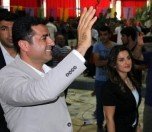Attendants worked in four different commissions; the Press Commission, Commission of Radio and Television, Public Broadcasting and TRT (Turkish Radio and Television) Commission and Internet Commission, and prepared reports. These reports were later read at the Council general assembly.
The Communications Council ended with this general assembly, where all attendants talked about their views and criticizms about the communications sector. Fikret Ilkiz, who is a consultant at the BIA legal unit, and a communications jurist, was in the "Internet Commission."
On behalf of the union of the Press and Communication Employees, (Haber Sen), Osman Kose attended the "Public Broadcasting and TRT Commission" meetings. Journalist Kose presented the commission a report about his union's views on public broadcasting.
There should be an Information Technology Ministry
The report by the "Internet Commission" called for the establishment of an Information Technology Ministry. With this report, the attendants wanted this ministry to develop the E-Turkey project. The ministry should be in co-operation with the related public institutions, non-governmental organizations (NGO), private sector, universities and the media, the report said.
Internet should be discussed in an interactive environment
The commission's report also talked about the Internet regulations in the Radio and Television Higher Board (RTUK) Law and the Press Law. The report said that article 31/2 of the radio and television law, which reads, "broadcasts through any technology or communication means," and other articles of the law that read, "data publishing," do not apply to the Internet. "The necessary regulations for Internet publishing should be decided on through interactive discussion by many attendants," the report said.
Press laws cannot be applied to the Internet
The report included many proposals on things to be done structurally, legally and in other fields. "Article 9 of the Press Law which refers to the Internet should be annulled," it read.
Discussions about TRT
During the meetings of the "Public Broadcasts and TRT Commission," TRT's situation was discussed. The attendants talked about TRT's legal structure and financial aids it receives, and thus, discussed publishing and broadcasting in Turkey.
"There can't be public broadcasts without an autonomy," read the report. "BBC was set as an example when TRT was being established. But as it happens all the time, the BBC model was changed a lot to fit the country's conditions," it said.
The report defined public broadcasts as broadcasts "that are for the public, financed by the public and controlled by the public." TRT and BBC cannot be compared
While discussing the public broadcasting organizations, the commission emphasized that serious problems arouse in Turkey, as it does in the world, when a comparison is made between these organizations and commercial televisions.
"Because of the differences in their functions, aims, and definitions, it is impossible to compare a commercial television with a public television," said the report. "The same mistake is made in Turkey too, and TRT is being compared to commercial television companies." (NK/BB/EA/NM)










